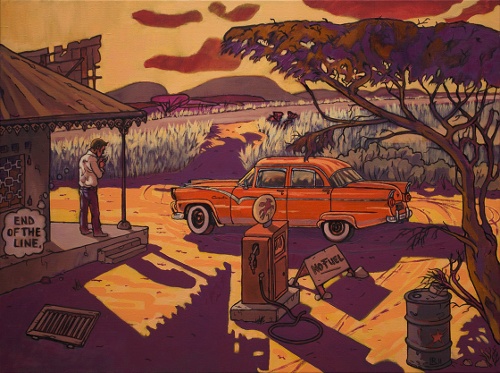End of the Line
There’s a new painting hanging on my kitchen wall. A friend of mine made it – he’s the one whose site I’m plugging in the links section at the right, and in this very sentence as well. He grew up in Africa, and for all that he looks like a pale, freckled redhead, he’s African at heart. He learned to act like a Middle European during middle teen-age, which is when I got to know him. He is what’s called a third culture kid.
 So among many other things, he does these really nice oil paintings. The one I bought is called End of the Line. When I bought it, a few months ago, I thought it was a nice painting, with the purple shadows and the pop-art-style outlines, and I found the title somewhat catchy.
So among many other things, he does these really nice oil paintings. The one I bought is called End of the Line. When I bought it, a few months ago, I thought it was a nice painting, with the purple shadows and the pop-art-style outlines, and I found the title somewhat catchy.
In the meantime, I’ve been thinking about freedom and the process of finding freedom, or becoming free, and the title of that painting has taken on deeper meaning. Take software freedom, for example: that’s one expression of freedom which has been important to me for decades now. I remember the day I felt the gut-level desire for software freedom for the first time: I’d been hacking software for a university project, using some non-free language implementation which had very useful bindings for some other non-free number-crunching library. It was all working, but then when writing my report, something occurred to me and I wanted to re-run the software on my data with some parameters altered. I had a fairly powerful (for the time) personal computer at home, and I had my program with me on a floppy disk (this was in 1993, before home internet access was widespread in Switzerland) – but while there was an implementation of that language, the library was not available for my home computer, so I was not able to run the software. I had to go back to the lab in order to re-run the calculations, and I felt that it was just plain stupid to have to do this. I’d run into a restriction of the freedom to redistribute software, which would have helped me. It was end of the line, I had run out of gas, metaphorically. But I could see freedom from the abandoned spot I was in.
Here’s another way in which hitting limitations – reaching End of the Line – is how freedom is perceived: in the mental discipline of meditation. Now there are many techniques and traditions around meditation, entire religions, but what I mean by that word in this post is: to sit down for an hour a day and pay attention to one phenomenon, to the exclusion of everything else. The single phenomenon being paid attention to can be anything at all, but traditional instructions include the physical sensation of the breath at the nostrils, or the mental repetition of a single word or short phrase, as suitable for beginners. When you start doing this, you will soon hit certain limitations on your ability to pay close attention to a single phenomenon for a prolonged period of time: memories will pop up; the body will send signals indicating discomfort with regard to the sitting posture, and so on. These distractions appear as very autonomous, and they can culminate in an End of the Line kind of experience of “I’m getting up, I can’t stand this.” This is an indication of where our freedom to do whatever we want (in this case, meditate for an hour) ends, or is restricted.
Discovering your limits can, paradoxically, be a very liberating experience. You can see freedom from the End of the Line. It’s that empty fuel barrel with a red star on it, or the space beyond the plot of elephant grass and the highway, with the hill country in the distance, or maybe smoking a cigarette. The important thing is to realize that freedom is there, and all it takes is going there. It’s exactly the same with Free Software, as it is with spiritual notions of freedom.